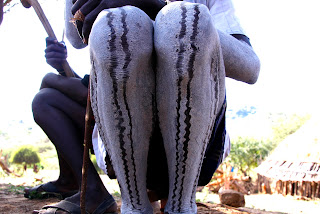On the day I left Ethiopia, my first
flight was to Istanbul, and seated next to me was a very beautiful,
Muslim Ethiopian woman who appeared to be in her late twenties or
early thirties. I greeted her in Amharic as she sat down in the
middle seat, with nothing but her purse in tow. She smiled, but
looked slightly uneasy.
After several moments of staring at and
inspecting the metal and fabric in her hand, she turned to me with a
slightly embarrassed look, and asked me with her eyes if I could
fasten her seatbelt. I smiled in an effort to reassure her that there
was no problem, demonstrated with my own seatbelt what she needed to
do, then repeated it one more time for her to see. “Wow”, I
thought to myself. This woman has never been on a plane!
Once everyone was settled into their
seats, the flight attendants came by with little plastic packets of
headphones, offering them to each passenger. My seatmate accepted
one, and then turned to me, again confused. I pointed to the small tv
screen on the back of the seat in front of us, and the small hole in
our armrests. I plugged her earphones in and then switched the tv on
and then off again. Her eyes widened and she looked over to the woman
on her right to see if she could believe this discovery.
Another flight attendant came by, this
time delivering a small red pouch for each of us. She hesitantly
opened the zipper and removed a small packet of foam ear plugs and
stared at them. I tapped her arm, waiting for her to watch as I took
my own, rolled one into a spiral, and carefully inserted it into my
own ear, unsure if she understood the purpose of this neon yellow
cone in my ear.
Next she took the eye mask out of the
pouch, and I tried to help her put it on without disturbing the
perfectly-placed scarf that covered her hair, which was clearly in a
pony tail or a bun underneath. She removed the last item from the
pouch, and looked for confirmation from me that those really were
socks they had given us. I gave her the thumbs-up sign and we got
ready for take-off.
Even if I had sat and thought about
what it was like to fly for the first time, I still could not
possibly have imagined all the things that were new to this woman,
and how incredible it would be for me to witness her experience. She
spoke slightly more English than I did Amharic, and we were able to
use this limited selection of words to exchange very brief
conversation.
At meal time, our trays came complete
with a rather nice array of food. She sat without touching her meal,
and I wondered if she was praying, but noticed that she seemed to be
waiting for something. As I reached for and opened the cardboard
packet holding the utensils, I saw a look of recognition on her face,
and she reached for her own with her beautifully henna-covered hands.
With about 45 minutes left to our
flight, I opened my window shade, and again, her eyes grew wide. We
were seated next to the wing, and she asked me if that was a
different plane. When she saw the clouds below us, she wanted to
know what they were. “Do I draw a picture?” I wondered. She asked
where the houses were as we stared from our window to the landscape
below us. I tried to explain that we were so high up, that it wasn't
possible to see the houses just yet. They would look very, very
small.
As we started our descent, she began to
grimace and brought her hand to her ear. I wasn't sure how
successfully I could explain to her how to plug her nose and blow to
release the pressure, so I dug in my backpack and handed her a piece
of gum, and also encouraged her to yawn.
I couldn't get over how new this all
was, and when I couldn't stand the curiosity anymore, I asked her
where she was headed. A big, shy smile came across her face, and she
said in a very thick accent, “Norway”, and held up her boarding
pass to Oslo. I looked at her, smiling and puzzled by her response.
She held up her left hand, showing me her ring finger, and said, “I
start a new life.”












